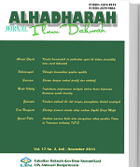Peran Ekonomi Islam dalam Dakwah Nabi Muhammad SAW
DOI:
https://doi.org/10.18592/alhadharah.v14i28.1230Keywords:
role of Islamic Economics, da'wah and leadership, Peran Ekonomi Islam, Dakwah dan KepemimpinanAbstract
Islamic economics is economics that is based on the Qur'an and the Sunnah of the Prophet. Islamic economics has been practiced since the prophet Adam and growing rapidly at the time of the prophet Muhammad, forwarded by friends and then continue to grow in people's lives today. The days of the Prophet, Islamic economic practices began to attract attention from the prophet Muhammad practice trading using a system of cooperation for the results (mudaraba) with the financiers (shahibul maal) and one of his partners is Siti Khadijah ra. Once the Prophet was appointed as the Prophet, in the process of preaching, Islamic economy to grow very rapidly, moral improvement of society a lot done, especially in terms of trade and the economic system of government and it demonstrates the important role of Islamic economics in building the economy of the time.Ekonomi Islam merupakan ilmu ekonomi yang berlandaskan kepada al-Qur’an dan Sunnah Nabi SAW. Ekonomi Islam telah dipraktikkan sejak nabi Adam as dan semakin berkembang pesat pada zaman nabi Muhammad SAW, diteruskan oleh para sahabat dan kemudian terus berkembang dalam kehidupan masyarakat hingga saat ini. Dimasa Rasulullah, praktik ekonomi Islam mulai menjadi perhatian sejak nabi Muhammad SAW mempraktikkan perdagangan dengan menggunakan sistem kerjasama bagi hasil (mudharabah) dengan para pemodal (shahibul maal) dan salah satu mitra beliau adalah Siti Khadijah ra. Setelah Nabi Muhammad SAW diangkat menjadi Nabi, dalam proses kegiatan dakwahnya, ekonomi Islam menjadi berkembang sangat pesat, perbaikan moral masyarakat banyak dilakukan khususnya dalam hal perdagangan dan dalam sistem ekonomi pemerintahan dan hal ini menunjukkan peran penting ekonomi Islam dalam membangun perekonomian saat itu.Downloads
How to Cite
Issue
Section
License
Authors retain copyright and grant the journal the right of first publication, with the work simultaneously licensed under the Creative Commons Attribution-NonCommercial 4.0 International Public License (CC BY-NC 4.0). This license allows reusers to distribute, remix, adapt, and build upon the material in any medium or format for noncommercial purposes only, provided that proper attribution is given to the original creator.







